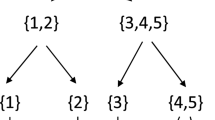Abstract
The principle of differential marginality (Casajus in Theory and Decis 71(2):163-–174) for cooperative games is a very appealing property that requires equal productivity differentials to translate into equal payoff differentials. In this paper we apply this property to axiomatic characterizations of values. We show that differential marginality implies additivity and symmetry under certain conditions. Based on this result, we propose new characterizations of the equal division and the equal surplus division values. Finally, we characterize two classes of convex combinations of values, i.e., \(\alpha\)-egalitarian Shapley values and \(\alpha\)-equal surplus division values, by employing differential marginality and establishing the uniqueness of these values on inessential games.
Similar content being viewed by others
Data availability
No data is used in our paper.
Notes
In Theorem 1 of Aczél and Oser (1966), they showed that f is linear if f is additive and monotonic.
References
Aczél, J., & Oser, H. (1966). Lectures on functional equations and their applications. Academic Press.
Casajus, A. (2011). Differential marginality, van den Brink fairness, and the Shapley value. Theory and Decision, 71(2), 163–174.
Casajus, A., & Huettner, F. (2013). Null players, solidarity, and the egalitarian Shapley values. Journal of Mathematical Economics, 49(1), 58–61.
Casajus, A., & Huettner, F. (2014). Null, nullifying, or dummifying players: The difference between the Shapley value, the equal division value, and the equal surplus division value. Economics Letters, 122(2), 167–169.
Casajus, A., & Yokote, K. (2019). Weakly differentially monotonic solutions for cooperative games. International Journal of Game Theory, 48(3), 979–997.
Driessen, T. S. H., & Funaki, Y. (1991). Coincidence of and collinearity between game theoretic solutions. Operations-Research-Spektrum, 13(1), 15–30.
Harsanyi, J. C. (1959). A bargaining model for the cooperative \(n\)-person game. In A. W. Tucker & R. D. Luce (Eds.), Contributions to the theory of games (Vol. 4, pp. 325–356). Princeton University Press.
Joosten, R. (1996). Dynamics, equilibria and values. Maastricht University.
Ruiz, L. M., Valenciano, F., & Zarzuelo, J. M. (1996). The least square prenucleolus and the least square nucleolus. Two values for TU games based on the excess vector. International Journal of Game Theory, 25(1), 113–134.
Shapley, L. S. (1953). A value for \(n\)-person games. In H. W. Kuhn & A. W. Tucker (Eds.), Contributions to the theory of games (Vol. 2, pp. 307–317). Princeton University Press.
van den Brink, R. (2001). An axiomatization of the Shapley value using a fairness property. International Journal of Game Theory, 30(3), 309–319.
van den Brink, R. (2007). Null or nullifying players: The difference between the Shapley value and equal division solutions. Journal of Economic Theory, 136(1), 767–775.
van den Brink, R., & Funaki, Y. (2009). Axiomatizations of a class of equal surplus sharing solutions for TU-games. Theory and Decision, 67(3), 303–340.
van den Brink, R., Funaki, Y., & Ju, Y. (2013). Reconciling marginalism with egalitarianism: Consistency, monotonicity, and implementation of egalitarian Shapley values. Social Choice and Welfare, 40(3), 693–714.
Xu, G., Dai, H., & Shi, H. (2015). Axiomatizations and a noncooperative interpretation of the \(\alpha\)-CIS value. Asia-Pacific Journal of Operational Research, 32(05), 1550031.
Young, H. P. (1985). Monotonic solutions of cooperative games. International Journal of Game Theory, 14(2), 65–72.
Acknowledgements
We are grateful to the reviewers for carefully reading and the invaluable comments and suggestions, which improves the presentation greatly. This research was partially supported by the National Nature Science Foundation of China (No. 72371151).
Author information
Authors and Affiliations
Corresponding author
Ethics declarations
Conflict of interest
The authors have no known competing financial interests or personal relationships that could have appeared to influence the work reported in this paper.
Additional information
Publisher's Note
Springer Nature remains neutral with regard to jurisdictional claims in published maps and institutional affiliations.
Rights and permissions
Springer Nature or its licensor (e.g. a society or other partner) holds exclusive rights to this article under a publishing agreement with the author(s) or other rightsholder(s); author self-archiving of the accepted manuscript version of this article is solely governed by the terms of such publishing agreement and applicable law.
About this article
Cite this article
Cui, Z., Shan, E. & Lyu, W. Differential marginality, inessential games and convex combinations of values. Theory Decis 96, 463–475 (2024). https://doi.org/10.1007/s11238-023-09954-8
Accepted:
Published:
Issue Date:
DOI: https://doi.org/10.1007/s11238-023-09954-8



